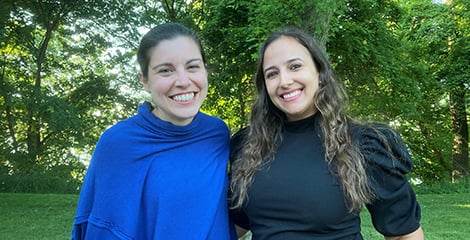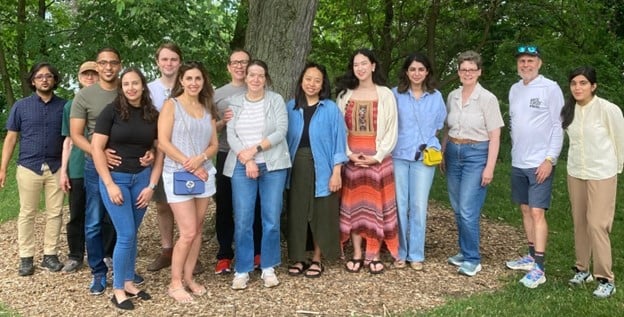Program Tracks
Categorical Track
Our internal medicine categorical program is based on a 4+1 schedule. Every 4 weeks of inpatient medicine is followed by a “y” week consisting of outpatient clinic experience, team-based learning didactics, and an innovative ultrasound and simulation center curriculum.
Our inpatient experience includes the general medical floors where residents care for a diverse group of patients and pathologies alongside our enthusiastic academic faculty. Interns rotate through two step down units supervised by cardiologists and pulmonary and critical care physicians, respectively. Our second-year residents rotate through our intensive care units spending time honing their procedure skills and management of critically ill patients. By their third year, residents take on a supervisory role leading the inpatient teams and assuming an important role teaching interns as well as medical students from Case, NEOMED, and a variety of other schools. Our graduates become exceptional hospitalists, primary care physicians and match into competitive fellowships.
Our residents love our 4+1 system that ensures a full weekend off every fifth week. We also have a true night float system, and there is no night call on elective rotations. See a general overview of our schedule below.
| Rotations (in weeks) | Year 1 | Year 2 | Year 3 |
| General Medicine Floor | 8 - 12 | 2* | 4 - 6* |
| Night Float | 4 - 6 | 4 | 2 |
| MICU | 2 | 7 - 9 | 2 - 3 |
| Medical Stepdown Unit | 4 - 6 | 0 | 2 - 4* |
| CICU | 0 | 6 - 8 | 0 |
| Cardiac Telemetry | 6 - 8 | 0 - 2* | 2 - 4* |
| Emergency Medicine | 0 | 2 | 2 |
| Electives/Research** | 8 - 10 | 11 - 13 | 11 - 13 |
| Vacation | 4 | 4 | 4 |
| Ambulatory | 10 - 11 | 10 - 11 | 10 - 11 |
| Intro to POCUS | 1 | 0 | 0 |
| Geriatrics | 2 | 0 | 0 |
| Resident as Teacher (RaT) | 0 | 4 | 1 - 2 |
| Medicine Consult (AMO) | 0 | 0 | 3 - 4 |
| Medicine Consult (Night Float) | 0 | 0 | 1 - 2 |
*Denotes supervisory role
**Residents can only take 4 weeks of research elective per year
Preliminary Track
The internal medicine preliminary track includes one year of residency training, which is followed by training in a subspecialty. There are ten preliminary positions offered each year.
Our preliminary interns are fully integrated into the program curriculum and work alongside our categorical residents, with the exception of continuity clinic. In addition, they are provided generous elective time.
The table below presents each rotation with the corresponding number of weeks throughout the one-year training period.
| Rotations (in weeks) | Number of Weeks |
| General Medical Floor | 10 – 12 |
| Cardiac Telemetry | 4 – 6 |
| Medical Stepdown Unit | 4 – 6 |
| Night Float | 4 – 6 |
| Elective | 16 – 18 (Up to 4 weeks for research.) |
| Vacation | 4 |
Primary Care of Vulnerable Populations Track
Are you committed to primary care? Do you have an interest in providing medical care and assistance to vulnerable patients?
The MetroHealth System and the Internal Medicine Residency Program are excited about our Primary Care of Vulnerable Populations (PCVP) Track. We offer a focused, 36-month residency track that provides a broad outpatient medicine curriculum along with required inpatient training.
Our goal is to prepare clinicians to become excellent primary care physicians who provide high-quality, comprehensive care for vulnerable and underserved populations.
The Mission of the MetroHealth Primary Care Track
The Mission of the MetroHealth Primary Care Track is to develop well-trained physicians who provide patient-centered primary care and who have the skills to adapt and thrive in primary care internal medicine.
Our primary care physicians are trained in the management of acute and chronic presentations of illness. Through an emphasis on longitudinal patient relationships, shared decision-making, and comprehensive patient-centered care, our primary care physicians can improve health outcomes and access to care.
Throughout the training, it is essential to our mission that we prepare our primary care physicians to become leaders in their community, address healthcare inequities through patient advocacy and community outreach, and contribute to clinical and academic medicine.
The PCVP Track offers unique opportunities for residents to rotate through primary care and outpatient-focused electives while having all the privileges of benefiting from the excellent, rigorous training offered in the Categorical Internal Medicine Residency Program. The following features allow for such training:
- A 3 + 1 + 1 schedule that allows for additional ambulatory rotations and populations health training.
- Co-directors and core faculty focused on primary care.
- A balance of core internal medicine requirements (inpatient, critical care) and subspecialties.
- Community engagement and health system collaboration.
- Additional experiences in leadership, medical education, quality improvement, point-of-care ultrasound, and advocacy.
- Personalized mentoring and coaching to support individual career goals.
All PCVP and Categorical residents are assigned to a “Residency House” or resident team. Every 5 weeks the Residency House is scheduled in their continuity clinics and outpatient didactics. Each PCVP resident has a panel of patients they co-manage with their primary care preceptor.
The ambulatory blocks for PCVP residents are carefully designed for ample patient continuity experience in the primary care clinic with both a suburban population and an urban population. Our patients are culturally diverse, and many are struggling with chronic diseases and various socioeconomic constraints. There are unique opportunities for specialized outpatient training in internal medicine specialties, community engagement projects, didactics, leadership development, and protected time for scholarship. The track allows for personalization and flexibility to tailor the training experience to the resident’s interests and career goals. The following table illustrates a typical PCVP resident’s rotations throughout the years.
| Rotations (in weeks) | Year 1 | Year 2 | Year 3 |
|---|---|---|---|
| Ambulatory Continuity Clinic | 10 - 12 | 10 - 12 | 10 - 12 |
| PCVP Required Electives | 10 | 10 | 10 |
| Additional Elective Time | 3-4 | 3-4 | 3-4 |
| Inpatient Service (Floors, Cards/Telemetry) | 10 - 14 | 2 - 4* | 6 - 8* |
| Medical Stepdown Unit | 4 - 6 | 0 | 4 – 6* |
| Intensive Care Unit (MICU, CICU) | 0 - 2 | 12 - 14 | 2 - 4 |
| Night Float | 4 - 6 | 2 - 4* | 2 - 4* |
| Medicine Consult Service | 4 - 6 | ||
| Geriatrics | 2 | ||
| Vacation | 4 | 4 | 4 |
| Total Ambulatory Experience | > 40% | > 40% | > 40% |
*Denotes a supervisory role.
We are proud of the numerous educational sessions provided in both the inpatient and outpatient settings. During the ambulatory clinic week, residents have two primary learning modules. First, third- year residents who rotate through the Resident-as-Teacher rotation are responsible for development and delivery of high-yield primary care topics. Additionally, residents have one session (4- hour block) every ambulatory clinic week, during which they engage in core outpatient internal medicine topics through multimodal learning methods, including interactive team-based learning, hands-on outpatient ultrasound learning (POCUS), and peer teaching and learning.
In addition to participating in rich learning opportunities with residents in the Categorical Track, PCVP Track residents have additional time to engage with their PCVP peers during Z-Week. During this time, they engage with one another using curriculum focused on social justice topics such as structural and social determinants of health, systemic racism, population health, and advocacy.
Administrative and Scholarly Time: This time is built into the PCVP Ambulatory block weeks and includes time for self-directed learning, patient follow-ups, a quality improvement project with a focus on reducing disparities, and refinement of academic skills in research and writing.
Community Engagement: We believe that multidisciplinary, wrap-around care is crucial to improving the health of vulnerable populations. PCVP residents partner with community organizations of their choice and assist the organization (in the capacity requested) to provide services to community members.
PCVP Ambulatory experience -- example
Y week – Continuity Clinic/Ambulatory week
| Monday | Tuesday | Wednesday | Thursday | Friday | |
|---|---|---|---|---|---|
| AM | Continuity Clinic | Didactics | Continuity Clinic | Administrative time | Continuity Clinic |
| PM | Continuity Clinic | Continuity or Urgent Care Clinic | Wellness time and/or scholarly activity time | Continuity Clinic | Continuity Clinic |
Z week – PCVP track week
| Monday | Tuesday | Wednesday | Thursday | Friday | |
|---|---|---|---|---|---|
| AM | PCVP experience | Didactics PCVP- specific | Continuity Clinic | Administrative time | PCVP experience |
| PM | PCVP experience | PCVP experience | Wellness time and/or Community Engagement | PCVP experience | PCVP experience |
Year 1 Z week PCVP experiences – Addiction and Pain management clinics, HIV and Hep C clinics, Rheumatology and Physical Medicine rehab, LGBTQ+ clinics, Weight management, primary care elective choice
Year 2 Z week PCVP experiences – Cardiology, Pulmonary, Endocrinology, Gastroenterology, primary care elective choice
Year 3 Z week PCVP experiences – Population health, personalized based on career path interests
Career development is an active process that spans all 3 years of residency training. Our program helps each incoming class get started early by having each resident , in conjunction with their faculty advisor, develop their own Individualized Learning Plan that includes career goals. The MetroHealth System, Population Health, Institute for Hope, and the Leadership in Medicine Education Pathway offer PCVP Track residents opportunities to receive training in medical education, quality improvement or research, informatics, and advocacy. Experiences in various electives and rotations based on resident preferences helps develop interests within primary care. PCVP Track residents are encouraged to participate in scholarly activities and mentor with various primary care or subspecialty faculty.
Career development is supported by tailored mentoring, educational sessions, elective opportunities, and scholarly projects. For example, during the second year, residents in each house are expected to participate in a QI project. Results are presented to the residency program. The program offers resources and guidance and financially supports residents to attend local, regional, and national conferences.
Dr. Vikas Gampa
Dr. Vikas Gampa
Dr. Gampa is the Director for the PCVP Track. An Ohio native, Dr. Gampa graduated from The Ohio State University and served as an AmeriCorps VISTA volunteer at Bronx-Lebanon Hospital in New York City.
He completed a primary care Internal Medicine residency at Cambridge Health Alliance in Cambridge, Massachusetts. Following residency, he obtained an MPH from Harvard TH Chan School of Public Health and was a Fellow in the Rural Health Leadership Fellowship through Massachusetts General Hospital.
As a fellow, he provided care for the Sicangu Lakota community at the Indian Health Service in Rosebud, South Dakota. His areas of interests include health equity for marginalized communities, LGBTQ+ care, and medical education.
He enjoys exploring national parks, dancing with his partner, and cooking at home.
Dr. Jayne Barr
Dr. Jayne Barr
Dr. Barr is the Associate Director for the PCVP Track. Dr. Barr grew up in West Virginia and Ohio. She graduated from Marshall University School of Medicine, Huntington, West Virginia and completed her residency training in the Internal Medicine-Pediatrics program at Wright State University, Dayton, Ohio.
Following residency, she started a Med-Peds private practice in Circleville, Ohio. After 15 years, she joined as a Med-Peds hospitalist at The Ohio State University and Nationwide Children’s Hospital as well as preceptor of the Combined Med-Peds clinic.
In 2016, Dr. Barr served as the Med-Peds Program Director at Western Michigan University School of Medicine and in 2020 joined MetroHealth as Associate Program Director in the Internal Medicine residency program with a focus on primary care.
Her areas of clinical interest are Quality Improvement, transitions of care, point-of-care ultrasound, and population health. In her spare time, she enjoys golfing, bike riding, and discovering Cleveland’s MetroParks.
Dr. Priyal Gandhi

Dr. Priyal Gandhi
Dr. Gandhi will be joining the Primary Care track September 2024 as Core Faculty in the Internal Medicine Residency program. She graduated from Johns Hopkins University School of Medicine and completed her internal medicine residency and Urban Health Primary Care Leadership Track at Johns Hopkins Hospital in Baltimore, Maryland. She has a special interest in addiction medicine and care for people living with HIV. Her educational focus includes educating medical trainees in the social and structural determinants of health and care for vulnerable populations.
She enjoys cooking vegan food, dancing, playing board and card games, and planning fun surprises for family and friends.
Our Interview Process and How to Apply
We are looking for applicants that are empathetic, diverse, motivated, self-directed, and collaborative learners. We believe in a holistic review of all the applications we receive. Our interviews are being held virtually October through January. During your virtual visit, you will have time to meet and talk with our residents.
In ERAS, there is a separate Primary Care for Vulnerable Populations track option which has a unique NRMP number. PCVP candidates who are selected to interview (including those who apply to both PCVP and categorical tracks), will be scheduled with the PCVP co-directors on Tuesday mornings via Thalamus.
Please refer to the Application Process for further information.
Questions on Signaling?
While we preferentially review applications from those who signal our program, we also consider applicants who do not signal us, particularly those who have indicated a geographic preference for the Ohio and Midwest area.



